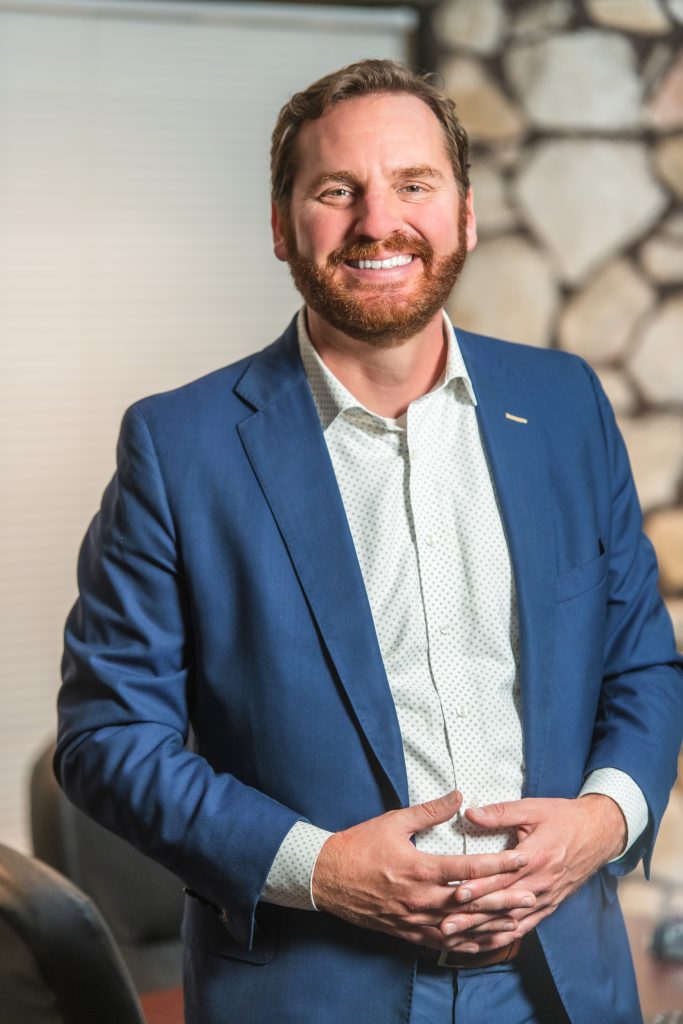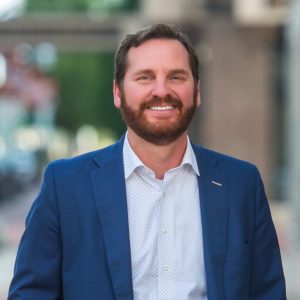Helping clients build a foundation for financial success
Helping clients build a foundation for financial success


Ryan Barber • Saginaw, MI
VantagePointe Financial Group • Royal Alliance Associates Inc.
Read full biography below
Proactive Advisor Magazine: Ryan, talk about the progression of your career in financial services.
My interest in financial services started in college. I was majoring in human resource management and, during my junior year, had an internship in the human resources department of an insurance company. Not only was I exposed to the basics of the financial-services industry, but I also learned a good amount about employee benefits and retirement plans. Seeing how a 401(k) works and the benefits of compounding one’s money over time were powerful concepts that had an impact on me.
Following college, I joined Equitable Financial, providing information and enrollment services for public school educators related to 403(b) tax-deferred retirement-savings plans. I received excellent training and mentorship and enjoyed being “an educator to educators” on their retirement-savings options. I would meet one-on-one with teachers, and occasionally their families, to explain how a 403(b) plan can help supplement a pension or other retirement savings. This process involved quickly gaining as much knowledge as possible about the client’s overall financial situation and was, in effect, an abbreviated form of financial planning. I liked the personal nature of the day-to-day interactions and that there was an element of an HR-type role in explaining the ins and outs of different retirement plan options, pension formulas, and the IRS code. Many of these 403(b) clients decided to enter into a deeper financial-planning relationship with me, and I am pleased that quite a few remain clients today.
After successfully providing these services for about six and a half years, I decided I wanted to pursue a role that provided more independence as a financial advisor. I started working with the broker-dealer Signator Investors and the wealth-management arm of the John Hancock Financial Network. In terms of my direct advisory and agency relationship, I have been a part of VantagePoint Financial Group and its predecessor company since my transition to independent advisor in 2007. I serve a broad base of clients, including many educators. My focus is on financial-needs analysis and strategies for retirement funding and income growth and protection. VantagePoint provides a collegial environment for its advisors and promotes high standards and quality processes in everything we do. I especially enjoy our peer-group meetings, where we can share knowledge and learn from one another.
Another important aspect of my career is my role as a SmartVestor Pro in the advisor referral program affiliated with Dave Ramsey and Ramsey Solutions. Dave Ramsey’s financial-education and money-management radio program has been one of the most popular programs in the U.S. for years. Individuals and couples reach out to the SmartVestor program to find an advisor in their area who is well-versed in Mr. Ramsey’s principles. Ultimately, Dave Ramsey teaches people how to get out of debt. His “7 Baby Steps” are at the core of his program. When completed successfully with an advisor’s guidance, they can create more freedom of opportunity for a client to employ their money and facilitate building wealth.
Describe the steps in your firm’s planning process.
We have a process that is very thorough and precise. We start by conducting a 90-minute meeting to review hard and soft data. The hard data involves everything we can discover about a client’s current financial situation: the accounts and risk-management coverages they currently hold, their assets and liabilities, their tax situation, their sources of income, how they approach cash-flow and debt management, and many other factors. We also gain their current perspective on some more quantifiable future issues. What age do they want to retire? How much money do they think they will need every month to support their lifestyle? Do they foresee future obligations such as educational funding, paying for a wedding, making a major purchase, renovating their home, or elder care, for example?
“We have a process that is very thorough and precise.”
The soft data is equally, if not more, important, uncovering motivations and goals. Just understanding what makes people tick can help us put them in a position to flourish. I probe what they aspire to do in retirement, the dynamics of their family situation, how they view their most important legacy objectives, prior investment experiences and possible biases, and how they assess their perspective on risk.
The next step includes our analysis of their financial situation and the data, having worked consultatively with the client to establish priorities for their financial plan. We then have another session we call the “Considerations” meeting, where I review potential strategic alternatives and solutions and discuss their overall retirement preparedness. During this meeting, we can establish the client’s comfort level and understanding of the pros and cons of various solutions that address areas such as risk management; retirement-income planning; estate planning; tax exposure and optimization; and accumulation, income, and wealth-preservation goals. Once we are on the same page, a full financial plan with suitable solutions can be developed and implemented. Importantly, we view a plan as a living document, subject to changes in any aspect of their lives. We conduct periodic reviews of progress versus objectives. We are always available to clients to review or consult on any specific questions, concerns, or financial issues—large or small.
What is your firm’s broad investment philosophy?
 We have a goals-based and customized investment-planning process. We believe that all too often people are not properly served by being presented with an upside-down investment approach. What that means is that a poor process selects investment products first and then tries to build a foundational strategy to justify those products. Equally bad is taking a cookie-cutter approach across clients. Instead, we believe the individualized financial plan comes first, which effectively sets an overall investment strategy. That, in turn, informs asset allocation and portfolio composition, followed only then by the selection of specific product solutions.
We have a goals-based and customized investment-planning process. We believe that all too often people are not properly served by being presented with an upside-down investment approach. What that means is that a poor process selects investment products first and then tries to build a foundational strategy to justify those products. Equally bad is taking a cookie-cutter approach across clients. Instead, we believe the individualized financial plan comes first, which effectively sets an overall investment strategy. That, in turn, informs asset allocation and portfolio composition, followed only then by the selection of specific product solutions.
I have no set point of view on strategic portfolio allocations—that is totally dependent on the objectives of the client’s financial plan. However, in general, I am a proponent of incorporating risk-managed strategies in clients’ investment plans. Ideally, we construct portfolios that can capture a large portion of gains in bull markets and that seek to mitigate losses in poor market environments. Many of our clients are in retirement or approaching it, and I educate them on the important issue of sequence-of-returns risk. It is critical for retirees to avoid the large portfolio losses that severe bear markets can hand them. I do not see the wisdom, especially for an older client, of just trying to ride out a 40% or 50% market decline when we have access to sophisticated, algorithm-driven strategies that can adjust to different market conditions. To this point, we work with many experienced third-party managers that offer a wide range of strategy solutions. Helping clients manage downside risk is a critical element of my practice.
At the end of the day, how do you view your role with clients?
I have been a financial advisor for over two decades and feel blessed to be in a career where I can have a positive impact on people’s lives. Clients share information with us that they likely do not share with anyone else. We treat that information with the strictest confidentiality, working hard to earn our clients’ trust and respect for the guidance we provide. Unfortunately, too many people in our country are on their own in trying to navigate their finances and plan for retirement. My goal as an advisor is to add value in many meaningful ways as we help clients address their important financial goals—which, in turn, can also help them realize their personal aspirations for the future.
 Ryan Barber is a financial advisor and vice president at the Saginaw, Michigan, office of VantagePointe Financial Group, a full-service advisory firm with multiple offices in the Midwest. Mr. Barber is also a SmartVestor Pro in the advisor referral program affiliated with Dave Ramsey and Ramsey Solutions.
Ryan Barber is a financial advisor and vice president at the Saginaw, Michigan, office of VantagePointe Financial Group, a full-service advisory firm with multiple offices in the Midwest. Mr. Barber is also a SmartVestor Pro in the advisor referral program affiliated with Dave Ramsey and Ramsey Solutions.
Mr. Barber grew up in eastern Michigan with his two sisters. His father was a math and science teacher, as well as a track coach for many years. His mother was a homemaker and later worked in the insurance industry as a claims adjuster. Mr. Barber says he has fond memories of his family “having a lot of fun together, especially on long camping trips throughout the U.S.” Mr. Barber was an accomplished athlete in high school, and was on the varsity track, cross-country, and basketball teams. He says, “I enjoyed running, but basketball was my passion. I held a school record for single-game three-point goals for several years and played one year of college ball.”
Mr. Barber graduated with a bachelor’s degree from Michigan State University (MSU), majoring in human resource (HR) management at the Eli Broad College of Business. He was an avid fan of MSU sports, enjoying the 2000 men’s basketball NCAA national championship. Mr. Barber had an internship with an insurance company’s HR department during college and says he was especially interested in learning about employee benefits and retirement plans.
After college, Mr. Barber joined Equitable Financial, providing information and enrollment services for public school educators related to 403(b) tax-deferred retirement-savings plans. He says he received excellent training and mentorship and enjoyed “being an educator to educators” on their retirement-savings options and overall financial planning. Many of his 403(b) clients entered a deeper financial-planning relationship with Mr. Barber and remain clients today.
Mr. Barber became an independent financial advisor in 2007, working with the wealth-management arm of John Hancock Financial Network. Mr. Barber has been with VantagePoint Financial Group and its predecessor company since his transition in 2007, serving a broad base of clients from all walks of life. His focus is on financial-needs analysis and strategies for retirement funding and income growth and protection.
Mr. Barber and his wife reside outside of Saginaw, Michigan, in a “charming small town.” They are active members of their community and church. They enjoy travel, golf, and spending time with their large extended family. Mr. Barber is also an avid fan of college basketball and football.
Disclosure: Securities and investment advisory services offered through Royal Alliance Associates Inc. (RAA). Member FINRA/SIPC. RAA is separately owned and other entities and/or marketing names, products, or services referenced here are independent of RAA. RAA does not provide tax or legal advice. 3875 Bay Road, Suite 1E, Saginaw, MI 48603, (989) 799-1500. Dave Ramsey and the Dave Ramsey SmartVestor Pro program are not affiliated with RAA and are not sponsored or endorsed by RAA. Working with an advisor that subscribes to the SmartVestor Pro network cannot guarantee investment success or that financial goals will be achieved. There can be no assurance that a SmartVestor Pro will produce or achieve better results than working with an advisor not affiliated with the SmartVestor program. Advisors pay a fee to belong to the SmartVestor Pro program. 4868070 07/22
Photography by Ryan Collier
New this week:

A financial-planning blueprint addressing specific client goals
Ryan Barber is a financial advisor and vice president at the Saginaw, Michigan, office of VantagePointe Financial Group, a full-service advisory firm with multiple offices in the Midwest.
Mr. Barber says his firm has a financial-planning process that is “very thorough and precise.” This process provides a financial blueprint that identifies disciplines to be addressed as the client “builds their foundation toward financial success.”
Plan elements for clients generally include the following:
- A comprehensive financial statement and financial-needs analysis.
- Identification of goals and priorities.
- Asset management and accumulation strategies.
- Retirement-funding planning and strategies.
- Income-protection strategies.
- Risk-management and tax strategies.
- Estate analysis and legacy planning.
- Where appropriate, a variety of planning and financial solutions for business owners.

